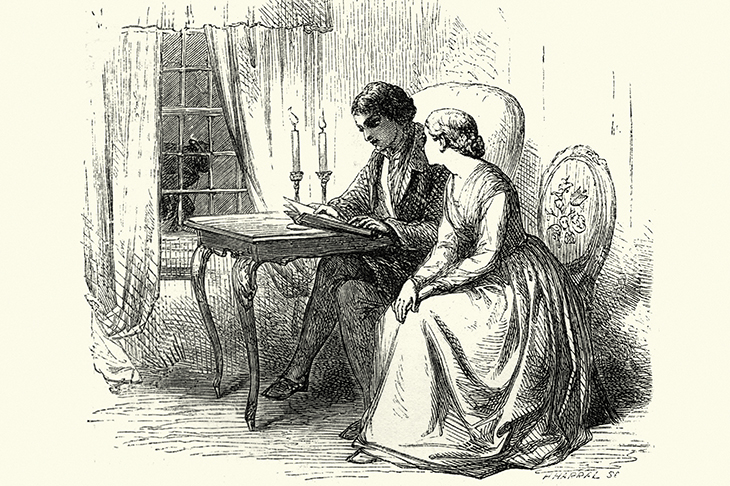My first night back in Blighty, I sat all evening at the kitchen table drinking wine with a charming, courteous English gentleman stricken in years. (I’ll call him Bertie. He enjoys the column and wrote inviting me to visit him at his pile on Exmoor.) I’m partial to old-fashioned English gentlemen, relishing above all their many rare qualities their disinterestedness. Before dinner we had slowly and deliberately drunk a bottle of red wine, and another one after that. He did most of the talking. His body was a calamity, but his mind was completely lucid. The vocabulary with which he expressed his mind was about ten times as large as mine and he wielded it with precision and virtuosity. As he spoke, his candlelit eyes flashed with youthful subversion and delight in his power of expression and in the comedy of the English language.
Fortunately, the poverty of my own thought, vocabulary, understanding and sensibility was established very early on, as soon as I opened my gob in fact, and my obligation to contribute to the conversation, and his to listen, was by mutual consent waived — much to my relief. His talk centred mainly on anecdotes from his long life. He had spent a lot of his time and effort trying to kill first Italians, then Germans, then Chinese. And there was an angry diatribe against personal computers and computer screens and the irresponsibility of the age that has allowed them to corrupt everyone. I crossed my right leg over my left, fixed my eyes on his face and listened carefully to the succession of anecdotes, and the railing against the digital age, while sipping deliberately from my glass at long intervals.
After about an hour, I crossed my left leg over my right. And after about another hour I returned my legs to their original position. The small log fire in the hearth died soon after the second wine bottle was found to be finished. Then we called it a night and felt our way through his immense house to our respective bedrooms.
I slept long and deeply and woke refreshed and happy to be back in poor old England. I found a bathroom up one set of stairs and down another, showered, put on my clothes, then found my way, via a third unfamiliar staircase, back down to the kitchen. My host was back in his chair at the kitchen table spooning from his breakfast bowl. A silent carer was bustling about among the sinks and wooden counters. I resumed my seat at the kitchen table. A walled sunlit garden, now visible through the windows, promised a dry day. The carer spoke to ask me whether I would like coffee. I asked her whether the Pope wore a dress. Then my host seamlessly recommenced his virtuoso talk, as if our eight hours’ oblivion in separate parts of his house had occurred in the blink of an eye. I crossed my right leg over my left and concentrated my attention now on his daylit face.
He escapes from the multitude of horrors of the modern world, he said, by rereading the Victorian novelists. And did I realise what was the single most amazing thing about these Victorian novels? I pulled my cross-eyed cretin face and shook it at him. ‘No machines,’ he said. His emphasis signified utter contempt for the word and for the infernal things themselves. ‘No electric light, no internal combustion engines, no telephone, no lawnmowers, no aeroplanes, no, no…what are the damn things called? No leaf-blowers. The action of the novels takes place in a world — other than a bit of steam, perhaps — of absolute silence and without a single machine of any kind. It is such a relief. Because machines, you know, are an absolute curse. Happily, people are now waking up to the fact. You can’t, for example, open a newspaper nowadays without everyone wringing their hands about the danger posed to civilisation by machines.’
He was about to enlarge on the danger to civilisation of machines when his words were drowned out by what sounded like an industrial grinder straining to clear a blockage. He bowed his head in absolute despair. ‘What on earth is that?’ I shouted above the racket. He couldn’t speak, his despair was too great. The carer indicated a mug in a niche under a nozzle protruding from a matt-black machine that I had taken to be a printer. Evidently it was a coffee machine that made coffee, starting with the actual coffee beans. The shattering noise was the grinding phase of the operation.
After coughing and choking like a terrier with a fur ball stuck in its throat, the coffee machine spat out a gout of black liquid into the bottom of the mug. Silence. My host raised his head and his eyes locked pleadingly on to mine. ‘We were given a choice of black or silver,’ he said.
Got something to add? Join the discussion and comment below.
Get 10 issues for just $10
Subscribe to The Spectator Australia today for the next 10 magazine issues, plus full online access, for just $10.
You might disagree with half of it, but you’ll enjoy reading all of it. Try your first month for free, then just $2 a week for the remainder of your first year.















Comments
Don't miss out
Join the conversation with other Spectator Australia readers. Subscribe to leave a comment.
SUBSCRIBEAlready a subscriber? Log in